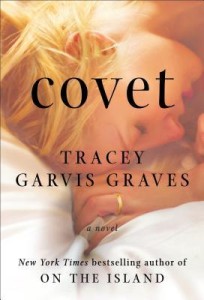 It's something you hear about a lot---authors that have a wildly successful debut novel struggle with their second. And it's something we've experienced too as finshed up our own sophomore effort recently, constantly wondering if The Status of All Things will stand up to Your Perfect Life when it's released next year.
So we went to our friend and fabulous author Tracey Garvis Graves to get her opinion. (We're also doing a book signing with her on June 11th at 7pm at Anderson's Naperville, IL! Come join us!) Her debut, On The Island, took off like a rocket and became a NYT bestseller. For her second novel, she went in a different direction with Covet, this time writing about a woman struggling after her husband loses his job. But her gamble paid off-- Covet was one of our favorite books of the year--heartfelt and amazing! So we asked her, how the hell did you do that? This is what she had to say:
It's something you hear about a lot---authors that have a wildly successful debut novel struggle with their second. And it's something we've experienced too as finshed up our own sophomore effort recently, constantly wondering if The Status of All Things will stand up to Your Perfect Life when it's released next year.
So we went to our friend and fabulous author Tracey Garvis Graves to get her opinion. (We're also doing a book signing with her on June 11th at 7pm at Anderson's Naperville, IL! Come join us!) Her debut, On The Island, took off like a rocket and became a NYT bestseller. For her second novel, she went in a different direction with Covet, this time writing about a woman struggling after her husband loses his job. But her gamble paid off-- Covet was one of our favorite books of the year--heartfelt and amazing! So we asked her, how the hell did you do that? This is what she had to say:
**we have one copy of Covet to give away. Leave a comment here to be entered--contest closes June 1st at 8am PST.
Avoiding the Sophomore Slump by Tracey Garvis Graves
 There are two words that every writer loves unequivocally: THE END. I always type these words in all caps because by the time I'm done with a manuscript, I am DONE. At the other end of the spectrum are two words that strike fear into most writers: sophomore slump. Thankfully, I will never have to worry about these two words again because my sophomore novel is now behind me.
There are two words that every writer loves unequivocally: THE END. I always type these words in all caps because by the time I'm done with a manuscript, I am DONE. At the other end of the spectrum are two words that strike fear into most writers: sophomore slump. Thankfully, I will never have to worry about these two words again because my sophomore novel is now behind me.
Writing your second book is every bit as scary as it seems, especially if your debut novel sold well. On the Island was rejected by every agent who received my query letter, but later went on to spend 9 weeks on the New York Times bestseller list. The rights have been sold to twenty-eight foreign publishers and the book has been optioned by MGM for a feature film. I sold 500,000 copies of the self-published edition and was later picked up by Penguin and offered a two-book publishing deal.
After the dust settled a little, the question everyone wanted the answer to was, "What's next?" I felt every ounce of the weight of my sophomore novel resting firmly on my shoulders; at times, it felt heavier than I could bear. On the Island was the most exciting and fulfilling thing that had ever happened to me as a writer, and the success of my debut novel is something I may never be able to replicate.
I had started writing the book that would become my sophomore novel while I was still querying On the Island. Conventional writing wisdom claimed that the best way to take my mind off of the rejections I'd soon be receiving was to start another book. So I did. The inspiration for Covet came from a real-life event. In the fall of 2008 my husband was in danger of being laid off. He was a valued employee and had been with his company for over fifteen years, but the recession was in full-swing and none of that mattered. I was a stay-at-home-mom at the time so the threat of losing our only source of income weighed heavily on my husband and me. Fortunately, he did not lose his job, but we knew many couples who weren’t so lucky. Most of my books start out as a question, and Covet was no different. I wondered, “What if my husband had lost his job? What if he wasn’t able to find another one? What effect would that have had on an otherwise strong marriage? The answers to those questions became the basis for Covet’s storyline. I just had to know what the outcome would be, and I felt that the premise would be relatable to many women.
I've always loved women's fiction (it's the genre I read the most) and really wanted to try my hand at writing it. I never once thought about whether it was a good idea to switch to women's fiction after writing a contemporary romance novel like On the Island, for several reasons. One, On the Island was still just a manuscript on my hard drive when I began writing Covet and two, I can only write the stories that speak to me the loudest. I didn't think about my audience because in the summer of 2011, I didn't have an audience. But I did feel that there was considerable crossover appeal between women's fiction and contemporary romance, so I immersed myself in writing this new story.
Fast forward two years. I'm gearing up for the publication of my sophomore novel, an event that I never imagined I would be blessed enough to experience. Every single thing was different this time around: format (my debut was self-published as an e-book and trade paperback; my sophomore novel was being released by a major publishing house in e-book and hardcover), genre, price, marketing, etc...In hindsight, there was a very slim chance that my sophomore novel would mirror the performance of my debut, although everyone involved (myself included) certainly hoped it would.
Covet was well-received by several literary review publications: Kirkus and Booklist gave it high marks, and one of the best reviews was written by a man at the New York Journal of Books who said that Covet was "Powerful stuff, honest and brutal." There were readers who reached out to say that I'd written their story. They had walked in Claire's shoes and felt every one of her frustrations and struggles. They fell in love with Daniel and their hearts ached for Chris. But Covet was not On the Island. Unlike writers whose debut novel is the first book in a series, I wrote a new stand-alone novel, about characters who were living very ordinary lives. Covet wasn't a romance novel, although it was widely referred to as one. There was no desert island survival. No sharks, tsunamis, or forbidden love. Some readers were probably thinking, "Hey, what's going on here?"
If I had a time machine I might have gone back and told myself to push Covet a little farther back in the queue. I might have told myself to follow up On the Island with a fast-paced, plot-driven romance novel instead of a quieter, character-based book about married women living in the suburbs and dealing with a variety of issues. But I didn't have a time machine and Covet is a book that means a lot to me. It's a book that spoke to a lot of readers because it was relatable.
I could have chosen not to sign that publishing deal. I could have decided not to write again at all for a while, to ride out the safe and happy wave of On the Island a little longer. I could have chosen to write spin-off books until there were no characters from On the Island left to write about (and I did, in fact, write a companion novella to On the Island called Uncharted, which I wrote after finishing Covet). But frankly, that's not what I wanted to do. I've always said that I'm not interested in writing the same book over and over again. My favorite authors are those who do not follow a formula, who take risks and aren't afraid to experiment. This is the kind of writer I aspire to be, and I hope to have a very long career, with more titles under my belt than I could have ever imagined.
I've received many wonderful e-mails and Facebook messages about Covet, and they mean the world to me. A few months ago a reader wrote to me and said that she'd borrowed Covet from a friend and had photocopied one of the pages, which she then carried around in her pocket. Her e-mail nearly brought me to tears. My sophomore novel may not have reached as many readers as my debut, but when a reader carries a page of your book around in her pocket, you know that the story did exactly what you hoped it would do. I sent this reader a signed copy of Covet, because I knew she would treasure it the same way I treasured her e-mail.
This is the kind of heartfelt connection that made me realize there's more than one way to measure the success of a sophomore novel. Out of all the books I write during the span of my career, I know my readers will have their favorites as well as a few they might not connect with as strongly, and that's okay. I'll keep writing the stories that speak to me the loudest, knowing that my readers will be there to listen.
Thanks, Tracey!
